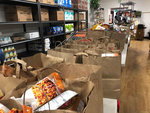

As grocery store prices keep rising, so does the demand for assistance from local food banks and pantries.
Inflation is at a 40-year high and according to the latest Consumer Price Index, food prices have gone up more than 10% since last summer. Organizations like Lakebay-based Food Backpacks 4 Kids (FB4K) and Gig Harbor Peninsula FISH Food Bank and Community Services are stepping up to meet the need, but nonprofits like these are also feeling the pinch.
High rent and soaring gas prices aren’t helping, either.
“People in our area are constantly debating whether they should use their gas to go to work, or go get food,” said Michelle Johnson, director of communications for FB4K.
“Some families can only come to us once a month because that’s all the gas they can afford.”
FB4K started out primarily providing weekend meals and snacks for kids across the Peninsula School District. That evolved into more of a food pantry-style model during the early part of the COVID-19 pandemic, and that model remains in place today. The pantry helps 100 families each week, some even with home delivery to help alleviate gas constraints.
FB4K depends on community donations, but Johnson said they are always looking for what she calls “food sponsors” — businesses and charitable organizations around the area that supply just one food staple, like bread or milk, on a regular basis.
“It’s a good way for businesses to be a part of the community, and share those values with their employees or members.”
Gig Harbor Peninsula FISH, the largest food bank in the area, just opened its new 10,000 square foot facility in Gig Harbor. The organization feeds around 400 families each week with about half coming to them from the Key Peninsula. That’s a 44% increase since last year, with almost one-third of those individuals being children.
By its calculation, FISH has provided more than 200,000 meals since October 2021: nearly $1 million worth of food. Even though 85% of what they give away is donated by the public and grocery stores, FISH still spends $20,000 each month out of its own pocket, double what was spent per month last year, to supplement donations. It even pays 20 cents for every paper bag used to pack groceries.
Since the organization does not get any price breaks, FISH always looks to shop the best sales and lowest prices. Volunteers use their own cars and pay for their own gas to pick up food orders and bring them back to the food bank, according to FISH volunteer coordinator and co-founder Jan Coen.
Coen said that senior citizens on a fixed income seem to be taking these increased costs the hardest. Some former donors are now clients.
“A senior can’t go out there and get a part-time job to supplement their income. They’re stuck,” she said. “It really makes an impact on their self-worth.”
Both FISH and FB4K strive to help their clients maintain their dignity, they said. No names or personal information are collected. All they need to know is how many people they need to serve.
“If you come to a food pantry, we trust you need our help,” Johnson said. “We’re open to anybody, any age. No barriers.”
Ron Coen, FISH co-founder and Jan’s husband, said the process at the food bank is simple: “Our donors don’t want anyone to go hungry. If you’re hungry, come and see us.”
Clients can load up on a week’s worth of food, and a volunteer will accompany them to make sure they feel comfortable grabbing what they need.
FISH and FB4K said their food inventory is strong for now, but it may get tough keeping up with the demand.
“Think about what you need when you go shopping,” Jan Coen said. “That’s likely what our clients need, too. We’re all in this together.”
The two groups always need food and financial donations, food drive hosts, and volunteers. To learn more, visit FB4K or FISH.
UNDERWRITTEN BY THE FUND FOR NONPROFIT NEWS (NEWSMATCH) AT THE MIAMI FOUNDATION, THE ANGEL GUILD, ADVERTISERS, DONORS AND PEOPLE WHO SUPPORT INDEPENDENT, NONPROFIT LOCAL NEWS